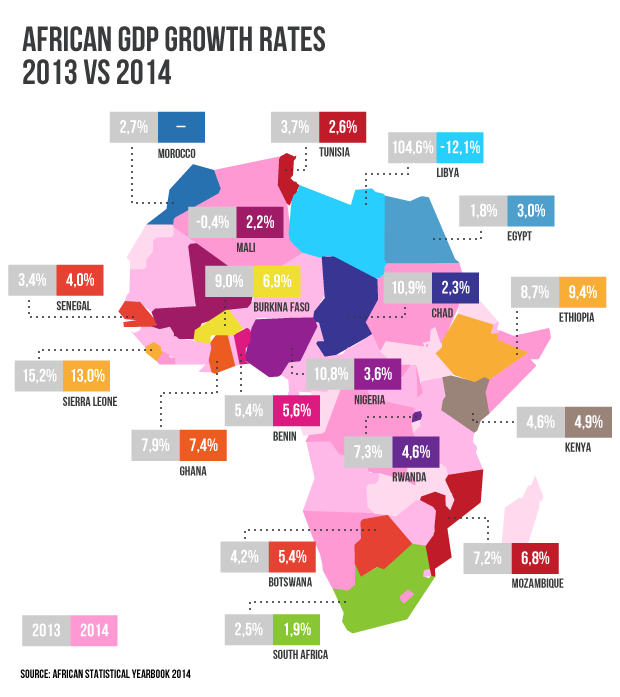![]() 5 minute read
5 minute read
Africa is not what you expect it to be. Continent is ready to take off via Chinese investments and small ventures. By 2020, large working force numbered with 122 million Africans will enter the labour market. Time to invest and here is where and why:
Supporting Start-up
culture
Global private equity firms’ investments in Africa have substantially grown and will continue to grow. What’s happening? Relying on available rich western experience of doing things, Africa skips the generation underwent by States and Europe, entering straight the digital world. Africa will follow India, where last year some funds have managed to net returns that are 3-10 times the investment value.
There is no doubt that start-ups and small ventures are risk to invest and require trusted local connections and deep market knowledge. However, the returns are spectacular. It is an investment in people – and they are less dependent on political instability than big corporations, especially e-commerce.
The outcome of small business and start-up development is tremendous for continent. Growth of small business will raise the Social Identity and prepare population for fast developing jump. Moreover, that will increase education level not only within youth but with adult population as well. The existing business already drove the creation of programs like “angel mentoring opportunities”. The number of conferences is devoted to raise the business opportunities in the continent, like Innovation Africa 2015: Developing African skills for the 21st century and Business in Africa Conference 2015 (Students Alumni Africa Business Network by University of Cambridge).
Economical
overview
The most significant improvements include incorporating small business activity and fast-growing industries (such as mobile telecoms, real estate, and the film industry).
 Clearly, Africa’s economies are some of the fastest-growing in the world, making them overflowing with investment opportunities. According to the International Money Fund, compared to global forecast growth of 3.2% in 2015, Kenya’s GDP alone is expected to grow about 6%, making it the country with the third-fastest projected growth in 2015. Nigeria, Africa’s largest economy, is also expecting growth of 7.3% in 2015. In contrast, the U.S. is expected to grow 3.1%, and the EU, a mere 1.2%.
Clearly, Africa’s economies are some of the fastest-growing in the world, making them overflowing with investment opportunities. According to the International Money Fund, compared to global forecast growth of 3.2% in 2015, Kenya’s GDP alone is expected to grow about 6%, making it the country with the third-fastest projected growth in 2015. Nigeria, Africa’s largest economy, is also expecting growth of 7.3% in 2015. In contrast, the U.S. is expected to grow 3.1%, and the EU, a mere 1.2%.
Africa gets online
Regarding mobile-cellular penetration, in 2014 Africa had the worldwide lowest numbers with 69% (comparing to 125% in Europe), showing the strongest growth at the same time. According to International Telecommunications Union, in Africa, almost 20% of the population got online by end 2014, up from 10% in 2010. Nowadays, only one out of ten households is connected to the Internet. However, household Internet access in Africa continues to grow at double-digit rates (at 18% in 2014, more than twice the growth of the world average). According to new study by Frost [&] Sullivan, mobile phone penetration is to reach 79% by 2020 in the continent.Traditional society is going to jump into digital world.
And there is no need
to reinvent a bicycle
What we might see is the cashless Africa. Skipping traditional financial centers to create online system – directly to Swedish banknote free culture. According to research by PwC, some banks in the market have already achieved operational savings by encouraging customers to migrate certain banking activities from the branch to electronic banking channels.
“I am a firm believer that as banking penetration grows in Africa, one cannot afford to build an extensive traditional bank branch network and hence these traditional models will be replaced with virtual / mobile money. This introduces opportunities for disruptive new entrants in the market.” – says Jyrki Koskelo, managing director in AtlasMara and Member of the board in The Africa Agriculture and Trade Investment Fund.
Bringing mobile financial services to unbanked consumers is nothing new. Australia and New Zealand Banking Group (ANZ) has brought mobile money in the Pacific nations of Samoa, Vanuatu, Solomon Islands and Papua New Guinea with ANZ goMoney. They enabled clients to use financial services avoiding using cash or using traditional banking channels. Meanwhile, in Kenya, the m-pesa offers mobile money service attempting to transform Kenya into a cashless society.
E-commerce boost
The speed of business development and return of investments in Africa both are unbelievably high. Just to illustrate the opportunities in numbers – e-commerce company Jumia.
 Within 3 years after establishment, Jumia has 1500 workers (started with only 3) and round value at €445 million in 2014. Moreover, since 2012 Jumia expanded from Nigeria to other African markets, like Cameroon, Egypt, Ghana, Ivory Coast, Kenya, Morocco, Uganda, Tanzania – and also UK. In 2015 African e-commerce site has launched in Angola, taking the number of countries in which it is active to 11. Selling a wide range of products, form clothes, to electronica, and even alcohol, Jumia has an ambition to become African Amazon. And the goal is not set too high as already in 2013 website received 150,000 daily unique visitors and 750,000 subscriptions. And not to forget, that Africa has the lowest Internet penetration in the world.
Within 3 years after establishment, Jumia has 1500 workers (started with only 3) and round value at €445 million in 2014. Moreover, since 2012 Jumia expanded from Nigeria to other African markets, like Cameroon, Egypt, Ghana, Ivory Coast, Kenya, Morocco, Uganda, Tanzania – and also UK. In 2015 African e-commerce site has launched in Angola, taking the number of countries in which it is active to 11. Selling a wide range of products, form clothes, to electronica, and even alcohol, Jumia has an ambition to become African Amazon. And the goal is not set too high as already in 2013 website received 150,000 daily unique visitors and 750,000 subscriptions. And not to forget, that Africa has the lowest Internet penetration in the world.




